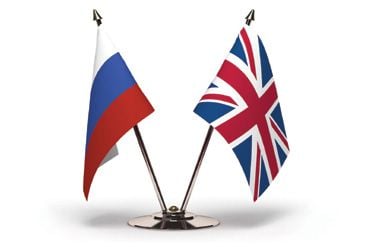“Vigil”: The BBC’s Submarine Drama Is the Anti-Russian Propaganda Machine in Action

All Global Research articles can be read in 51 languages by activating the “Translate Website” drop down menu on the top banner of our home page (Desktop version).
Visit and follow us on Instagram at @crg_globalresearch.
***
The scene: a British nuclear submarine. A detective has been sent to investigate the death of a sailor. When she asks the Naval Commander why there needs to be so much secrecy, as Britain is not at war, he responds ‘That is an illusion. We have always been at war’.
The series, entitled ‘Vigil’ is the BBC’s most watched drama of the year, and has been well publicised, attracting an audience of 10.2 million over its first week. It depicts a fight with an illusive, ruthless adversary that successfully manages to infiltrate a UK submarine to ‘knock out Britain’s nuclear deterrent’, killing British citizens in the process. The murder weapon of choice is a nerve agent; can you guess who the enemy is yet?
Of course it’s Russia. Nuclear submarines, nerve agent, a treacherous opponent; from the opening sequence with video footage of Vladimir Putin and Dmitry Medvedev projected onto a submarine, the audience is under no illusion as to who this adversary is. Nowadays, the British public almost expects it to be Russia.
For years now the UK population has been schooled on ‘evil Russia’ across all media platforms – from the news to TV dramas to films – with the line between fiction and reality becoming increasingly blurred. One of the most Googled questions about the ‘Vigil’ drama series is ‘is it real?’ This is hardly surprising given the sheer volume of anti-Russian content, with cinema often dramatising real life events and vice versa.
Take the Skripal case, for instance. The apparent poisoning with ‘Novichok’ of the former spy Sergei Skripal and his daughter took place just a few months after a British/American TV series ‘Strike Back’ was released, in which a ‘rogue Russian biochemist‘ was working on a substance of the very same name. That was probably the first time that western audiences had ever heard the word ‘Novichok’, and yet, by extraordinary coincidence, it was to appear on our TV screens just a few months later, in the news. The finger of blame was immediately pointed at Moscow, just as preparations were being made for Russia to host the 2018 world cup. The timing could not have been worse for the Kremlin, and yet it helped Britain considerably in its bid to discredit Russia in its hosting of the sporting event.
TV and cinema being used by governments as instruments to sway and foster public opinion is nothing new. In the book ‘Propaganda and empire: the manipulation of British public opinion, 1880-1960’ John M MacKenzie explores the plethora of ways the British government promoted imperialism throughout the empire’s existence, not only through cinema, but using everything from cigarette cards to school textbooks. During the war, the British Ministry of Information also pumped out films with instructive government messaging under the direction of Humphrey Jennings. These documentaries were more about what to do and what not to do, promoting slogans such as ‘grow your own’ and ‘make do and mend’ to aid the war effort on the home front.
The Nazis however, under the direction of Joseph Goebbels, were even more expert at the propaganda machine. Prior to the outbreak of the Second World War, the Germans sought to make a future military offensive more palatable to the public by commissioning the production of several feature films designed to stir up anti-British sentiment. ‘Traitor’ of 1936, was one particular example of this, depicting the infiltration of foreign agents in a Germans arms factory. Such anti-British films continued to be produced throughout the war, with ‘Germanin’ released in 1943, showing Britain to be a heartless and opportunistic colonial power.
Ominously, the more one analyses the current anti-Russian propaganda campaign in the western media, the more parallels can be found with the German efforts in the run-up to WW2. The seeds that ‘Russian is an enemy’ have been firmly planted in the consciousness of the British and American public for years now, particularly in the last decade, as relations between Russia and the West began to deteriorate. The campaign is unrelenting, like an obsession, and has probably even surpassed the levels of the anti-Soviet propaganda we saw during the 20th century. As Dmitry Polyanskiy, Russia’s Deputy to the UN, tweeted recently:
That’s serious illness…Russophobius Vulgaris. Treated by isolation from Western media at least for a week. But may be recurring as the brain damage is already considerable! #KeepCalmAndBlameRussia https://t.co/Is3ldIcS7e
— Dmitry Polyanskiy (@Dpol_un) September 18, 2021
One could argue that the British government has no relationship to the production of TV dramas. But let’s not forget the BBC is a state broadcaster, with an editorial line, toeing the government line when it comes to foreign policy. We know from some whistleblowers who have spoken out, that shows are approved by people at the top, and management has the authority to approve or ‘kill’ programmes. Former BBC journalist John Sweeney – although himself taking a strong anti-Russian position – wrote about how ‘direct intervention’ from management prevented some of his documentaries from being broadcast, and in a letter to Ofcom he indicated there was politicisation of programming. He suggested that BBC leadership at the time, under Tony Hall, was not interested in anti-Russian programmes. Clearly the stance has changed since Hall left his position in August last year.
The ‘Vigil’ drama obviously had a considerable budget. And its political function is twofold; it highlights the ‘threat’ from Russia, and the question of the Trident’s future in an independent Scotland. By playing up the idea of a real, imminent danger from Russia, it persuades the viewer of the importance of retaining Britain’s nuclear deterrent. As tensions grow between East and West, and Boris Johnson pursues his ‘Global Britain’ strategy, we will no doubt see more programmes emphasising Britain’s military strength countering Russia and let’s not forget, China. Sadly, such manipulation of the population doesn’t encourage understanding between peoples and instead, fosters division and discrimination. At best it is Britain using Russia as a scapegoat to bolster its sense of national pride; at worse, it is laying the groundwork for a future conflict with Russia.
*
Note to readers: Please click the share buttons above or below. Follow us on Instagram, @crg_globalresearch. Forward this article to your email lists. Crosspost on your blog site, internet forums. etc.
Johanna Ross is a journalist based in Edinburgh, Scotland. You can follow the author on Twitter.


